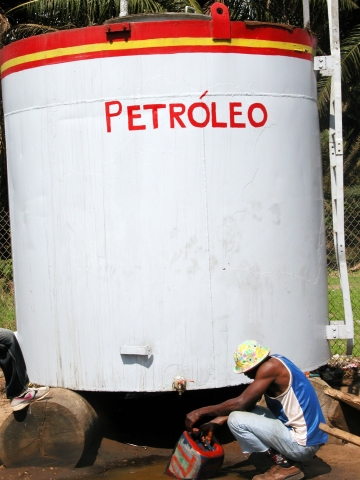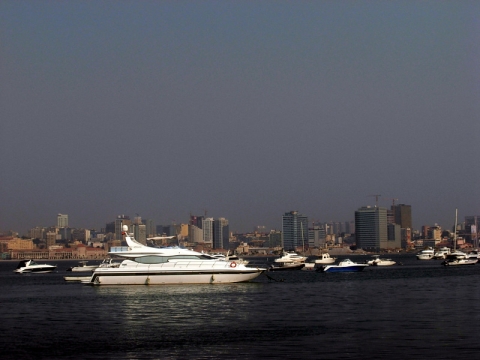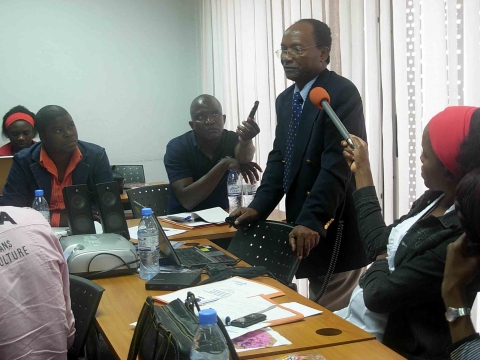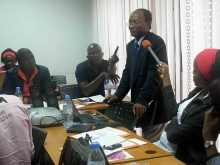
Angola’s oil wealth trickles down with shocking inequality to the majority of its people.

A US$5.5 million Ferrtti yacht moored at Luanda bay, against a backdrop of rising skyscrapers and miserable slums. Photo credit: Mercedes Sayagues

Dr. Joachim Dumas announces the vaccination of 10,000 teens against HPV and cervical cancer. Photo credit: Mercedes Sayagues
Before the end of the year, Angola will vaccinate 10,000 young teen girls against human papilloma virus (HPV), which causes cervical cancer - the most frequent cancer among Angolan women aged 15-44, and the most lethal, killing more than 1,000 women every year.

Dr. Joachim Dumas announces the vaccination of 10,000 teens against HPV and cervical cancer. Photo credit: Mercedes Sayagues
However, they had a real interest in health reporting. Five reported mainly on health. Several worked in African languages in rural areas and were committed to informing their communities about health. As in Mozambique, there is no health specialization for journalists in Angola. And, because of the high cost of living in this oil-and-diamond-distorted economy, there are few media training workshops to fill in gaps. Luanda is rated the world’s most expensive city by Time magazine.

Dr. Joachim Dumas announces the vaccination of 10,000 teens against HPV and cervical cancer. Photo credit: Mercedes Sayagues
Life expectancy is 48 years. Rural fertility is 7.8 children per woman. Child mortality is among the worst in the world. The government spends a mere five per cent of its total budget on health. Angola is listed No. 158 out of 172 countries in the 2010 United Nations Human Development Index.
Packed program
The intensive seminar program covered family planning, early pregnancy, unsafe abortion, obstetric fistula, sexually transmitted infections, HIV from a gender perspective, sex workers and gay people’s vulnerability to HIV, and a background on the right to health and gender aspects of reproductive and sexual health.

Dr. Joachim Dumas announces the vaccination of 10,000 teens against HPV and cervical cancer. Photo credit: Mercedes Sayagues
That was a lot to cover, and we put in long hours. I was amazed by the group’s commitment and interest, even when we went beyond 5 pm.
Ethics was a heated session. Angolan media routinely publish the full names and photos of underage girls who have been raped, often with gory details. Several participants thought that was OK. Others – especially members of the Forum of Angolan Women Journalists – blasted them for that insensitive view. Most of those who found it OK changed their views during the debate.
One resisted, insisting the public had a right to know the name of raped girls. The clincher was to ask him how he would feel if it were his daughter who was identified. First he evaded the question. His colleagues demanded an answer, until he stammered and admitted he would not like it. I do hope the seed planted will grow into change.
Unaids and the World Health Organization organized the seminar. Unaids requested Knight/ICFJ if I could come from Mozambique to lead it, as I have trained journalists on HIV/AIDS reporting in Angola and know the country well. During the week, the journalists filed more than 30 pieces to their radios, including several in French for AFP.
At the end of the workshop, the journalists’ rating of their knowledge on reproductive health issues and ethics jumped to good and excellent. And they were fired up about telling their readers and listeners how to deal with obstetric fistula, cervical cancer and family planning.